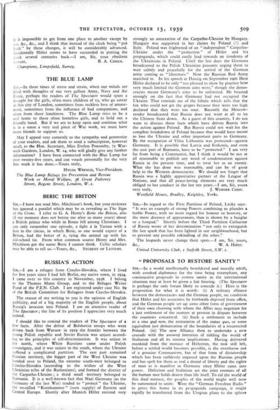RUSSIA'S ACTION SIR,—I am a refugee from Czecho-Slovakia, where I
lived for five years since I had left Berlin, my native town, in 1934. I came over to this country in November, 5938. I belong to the Thomas Mann Group, and to the Refugee Writer Fund of the P.E.N. Club. I am registered under case No. 89 of the British Committee for Refugees from Czecho-Slovakia.
The reason of my writing to you is the opinion of English publicity, ,and of a big majority of the English people, about Russia's invasion into Poland. I am an attentive reader of The Spectator ; the line of its position I appreciate very much indeed.
I should like to remind the readers of The Spectator of a few facts. After the defeat of Bolshevist troops who were driven back from Warsaw in 1919 the frontier between the young Polish republic and Soviet Russia was unjust accord- ing to the principles of self-determination. It was unjust in the north, where White Russians came under Polish sovereignty, and it was unjust in the south, where the Ukraine suffered a complicated partition. The east part remained Russian territory, the bigger part of the West Ukraine was handed over to Poland, the extreme south-west belonged to Czecho-Slovakia (according to the wishes of the West Ukrainian tribe of the Ruthenians), and formed the district of the Carpatho-Ukraine ; a third small territory belonged to Rumania. It is a well-known fact that Nazi Germany (as the Germany of the last War) tended to " protect " the Ukraine, the so-called " Kornkanuner " (corn supply) of Eastern and Central Europe. Shortly after Munich Hitler resisted very
strongly an annexation of the Carpatho-Ukraine by Hungary. Hungary was supported in her claims by Poland (!) and Italy. Poland was frightened of an " independent " Carpatho- Ukraine under the " protection " of Hitler and his propaganda, which could easily lead towards an irredenta of the Ukrainians in Poland. Until the last days the Germans broadcasted to the Polish Ukrainian peasants urging them to wait calmly and peacefully for the arrival of the German army coming as " liberators." Now the Russian Red Army marched in. In his speech at Danzig on September 19th Herr Hitler declared to be only " too pleased to show by practice how very much limited the German aims were," though the demo- cracies meant Germany's aims to be unlimited. He boasted strongly on the fact that Germany had not occupied the Ukraine. That reminds me of the fabula which tells that the fox who could not get the grapes because they were too high declared that they were too sour. Recently the Moscow- sender broadcasted that Russia does not want at all to let the Chinese State down. As a guest of this country, I do not want to discuss those facts which have driven Russia into the action against Poland. But Russia could not wait for the complete breakdown of Poland because that would have meant to lose the Ukraine and other important parts to Germany. By the occupation of Vilna Lithuania was protected—against Germany. It is possible that Latvia and Esthonia, and even the east part of Rumania, have to be " protected." I am very far from being a Communist, but I think it would be not at all reasonable to publish any word of condemnation against Russia in the present time, and to treat her as an enemy. What she has done was reasonable, and can be of great help to the Western democracies. We should not forget that Russia was a highly appreciative partner of the League of Nations, and that all peace-loving elements are very much obliged to her conduct in the last ten years.—I am, Sir, yours Sta,—In regard to the First Partition of Poland, Lecky says: " It was an example of strong Powers combining to plunder a feeble Power, with no more regard for honour or honesty, or the mere decency of appearances, than is shown by a burglar or a footpad." Shortly before the Third Partition Catharine of Russia wrote of her determination " not only to extinguish the last spark that has been lighted in our neighbourhood, but to prevent any possible rekindling of the ashes."
The leopards never change their spots.—I am, Sir, yours,










































 Previous page
Previous page